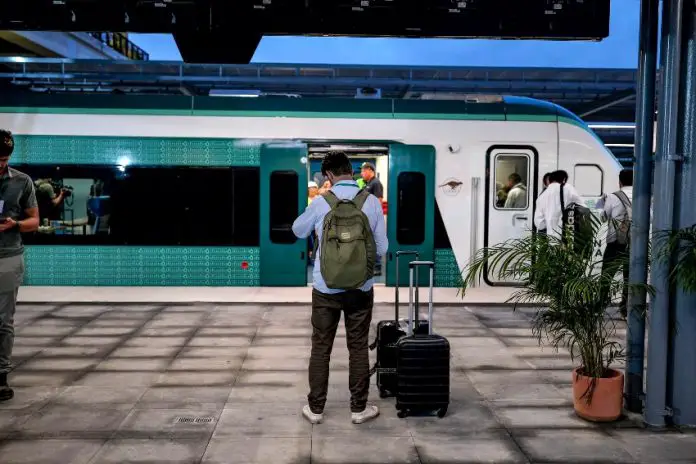Will the Maya Train railroad eventually become a popular mode of travel between beach resorts, colonial cities and archaeological sites in Mexico’s southeast?
Only time will tell, but passenger numbers so far are well below the federal government’s targets.
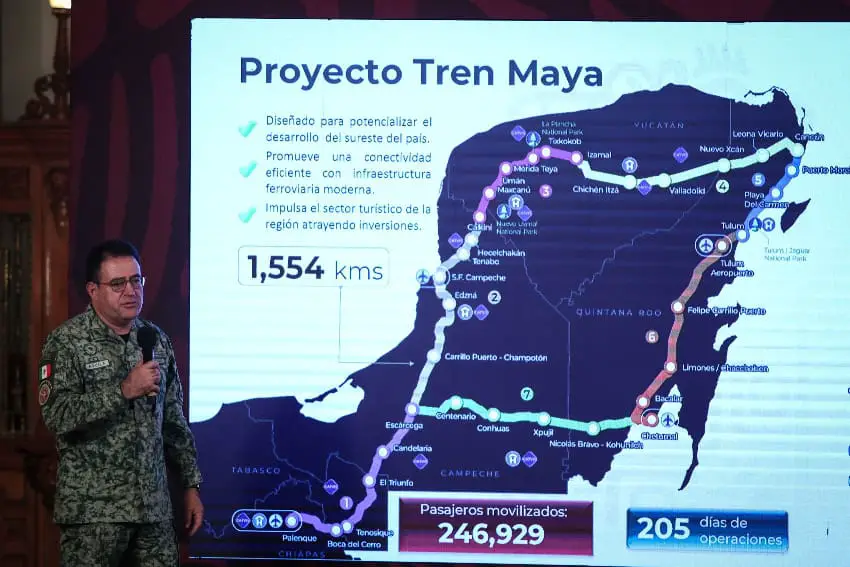
Óscar David Lozano Águila, an army general and general director of the Maya Train, reported on Monday that 246,929 passengers traveled on the railroad between Dec. 16, 2023 — when services between Campeche city and Cancún commenced — and July 11.
The average daily number of passengers during the railroad’s first 205 days of partial operation was 1,204.
The government has stated that it is targeting daily ridership of between 22,000 and 37,000 passengers at some point in the future. Average daily passenger numbers in the seven months since the railroad opened represented just 3-5% of those figures.
Nevertheless, Lozano was upbeat during a presentation he gave on the railroad at President Andrés Manuel López Obrador’s morning press conference.
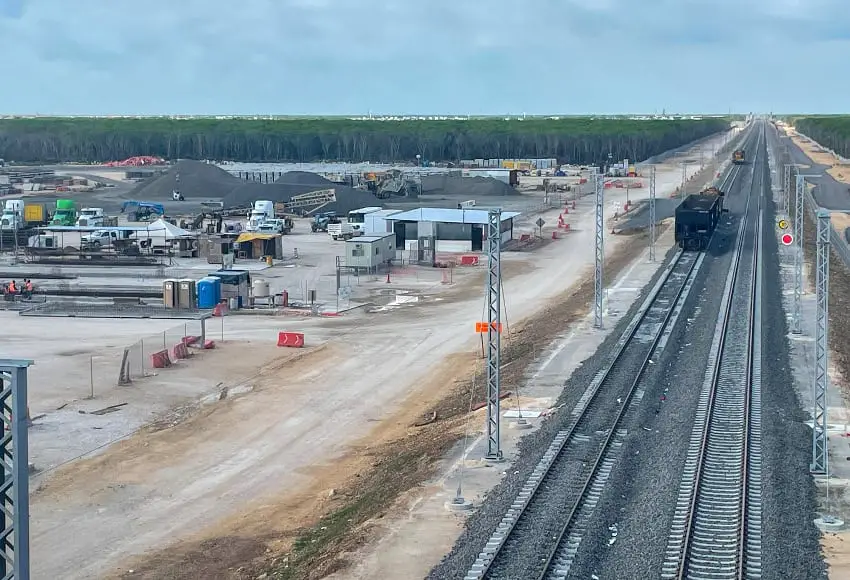
“We’ve managed to transport almost a quarter of a million people since Dec. 16 when we began operations,” he said, adding that those passengers could fill Mexico City’s cavernous Estadio Azteca 2.6 times over.
Passenger numbers should increase when the railroad is finished
Only 4 1/2 sections of the seven-section 1,554-kilometer-long railroad are currently open.
Those sections — 1,2,3,4 and the northern part of section 5 — link Palenque, Chiapas, to Playa del Carmen, Quintana Roo, via the states of Tabasco, Campeche and Yucatán.
Yet to open is the southern part of Section 5 between Playa del Carmen and Tulum, and Sections 6 and 7, which will connect Tulum to Escárcega, Campeche, and include stations at Bacalar and Chetumal. López Obrador recently said that that the entire Maya Train railroad would open “at the end of August” or in “the middle of September.”
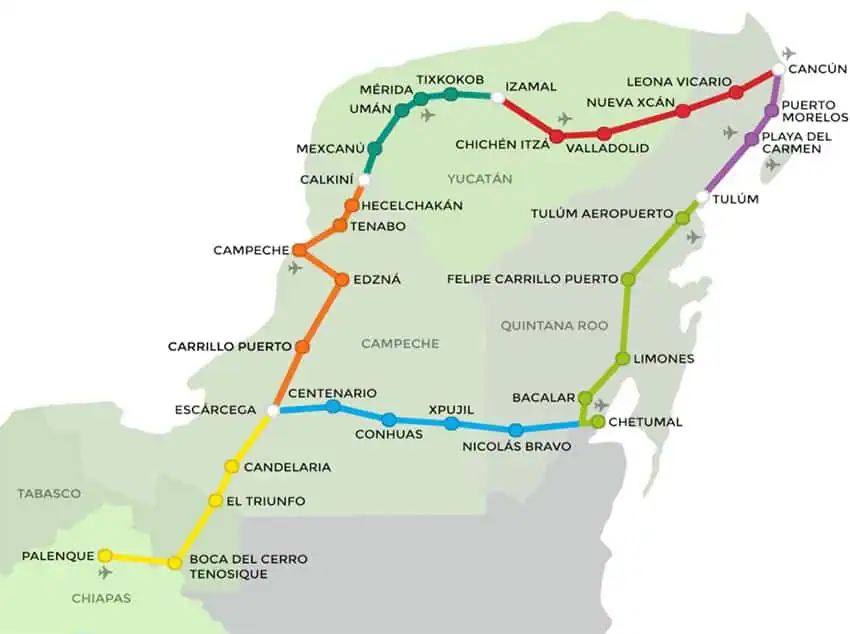
Passenger numbers should increase once the entire stretch of railroad in Quintana Roo is open as it will provide an additional way to get to popular tourism destinations in the Caribbean coast state, such as Tulum and Bacalar.
The opportunity to ride the rails around the entire Maya Train loop should also attract more passengers.
The government hopes that tourists flying into Cancún will use the train to complete a journey through all five states the railroad traverses, disembarking at stations along the way to visit archaeological sites such as Chichén Itzá and Calakmul, colonial cities such as Valladolid and Campeche and coastal destinations such as Tulum. Passengers will be able to stay in six state-owned Maya Train hotels situated along the route.
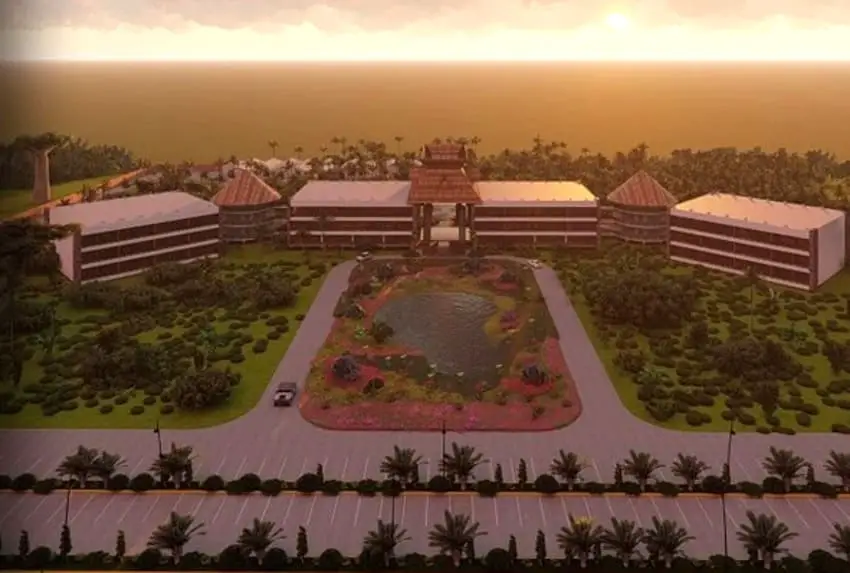
Cancún is a hugely-popular destination for international tourists, but relatively few foreigners have traveled on the Maya Train to date.
Increasing the number of trains running on the railroad should also lead to an increase in passenger numbers. The Associated Press reported that only 17 trains are currently operating, but “three times as many may eventually be added.”
Most passengers have used the railroad for short trips
Lozano presented data that showed that 43,065 people – including MND writer Lydia Carey – have completed the 857-kilometer trip from Cancún to Palenque or vice versa since January 1, the date on which rail travel between those two cities became possible.
That means that an average of just 223 passengers per day completed that journey in either direction between Jan. 1 and July 11.
Most passengers have opted to take shorter trips on the Maya Train. Trips between Cancún and Mérida, and Mérida and Campeche, have proven to be particularly popular.
How many foreigners have ridden the rails?
Lozano didn’t say how many foreigners in total have taken a trip on the Maya Train since the railroad opened last December, but he did reveal how many have completed the journey between Cancún and Palenque.
Of the 43,065 passengers to have completed that trip, 1,808 — or 4.2% of the total — were foreigners.
Will the Maya Train actually get me to where I want to go?
In her guide to travel on the Maya Train, Lydia Carey wrote about her biggest frustration with her journey by rail in southeastern Mexico.
“After eight days and seven stops, I can tell you that the biggest issue I faced was not the train itself, but the transportation infrastructure from the stations to the destinations where we stopped,” she said.
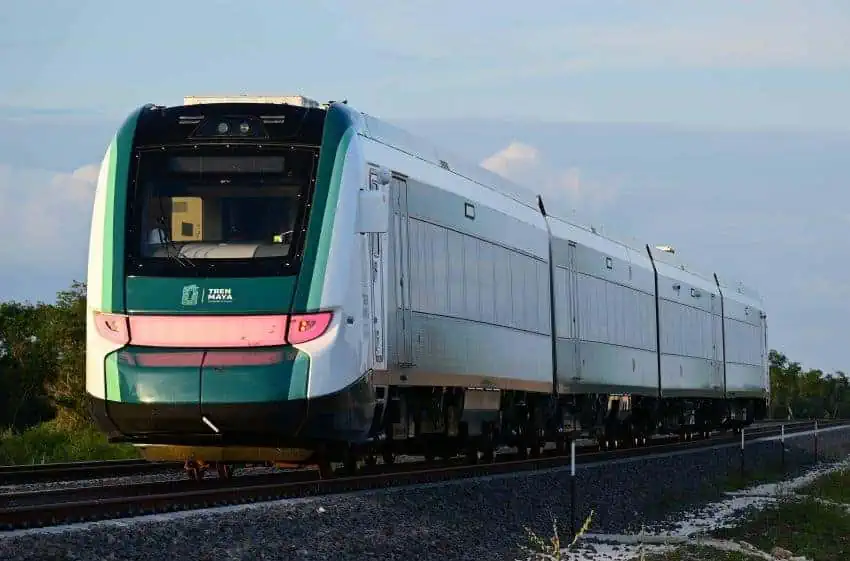
The problem arises because many of the stations are not very close to the destinations they serve. The station for Mérida, for example, is around 15 kilometers southeast of the center of the city in the municipality of Kanasín. Electric buses shuttle passengers between the center of the Yucatán capital and the Teya station, but onward transport at some stations in smaller destinations is not as reliable.
Passengers traveling between Cancún and Tulum will also face fairly lengthy onward journeys to get from Maya Train stations to coastal destinations, where hotels and resorts are located.
The Playa del Carmen station is located about 13 kilometers from the resort city, the Puerto Morelos station is about 10 kilometers inland and the Tulum station is around eight kilometers from the town’s hotel zone.
According to AP, “critics say there is little evidence the Cancún-Tulum line will make the [Maya Train] project profitable, because it doesn’t run particularly near any of the resort towns it is supposed to serve.”
The government decided to move the line inland in 2022 after hoteliers and members of the broader business community argued that the railroad would have an adverse impact on the coastal highway and the vehicles that use it, especially as it was being built.
The cost of the Maya Train project
A 2019 government study estimated that the railroad would cost US $8.5 billion to build, but the price tag has increased to at least $20 billion. AP reported that López Obrador’s pet infrastructure project could end up costing as much as $30 billion.

The president has long argued that the construction and operation of the railroad will bring economic prosperity and social wellbeing to Mexico’s disadvantaged south and southeast.
President-elect Claudia Sheinbaum is committed to commencing freight services on the railroad, and recently said she was analyzing a proposal to extend it to Progreso, a Gulf of Mexico port city located north of Mérida.
Environmental groups and others have criticized the Maya Train project, which cut down large swathes of forest to build the tracks. In addition, steel and cement pilings pierced through the roofs of limestone caves along a section of the railroad in Quintana Roo.
Environmentalists have expressed a range of other concerns about the construction and operation of the railroad, including the potential impact on wildlife.
López Obrador inaugurated construction of the railroad in June 2020, and pledged at the time to complete it in 28 months, or by October 2022. However, the project has faced a range of challenges, including court rulings that have temporarily halted work.
With reports from López-Dóriga Digital and AP
